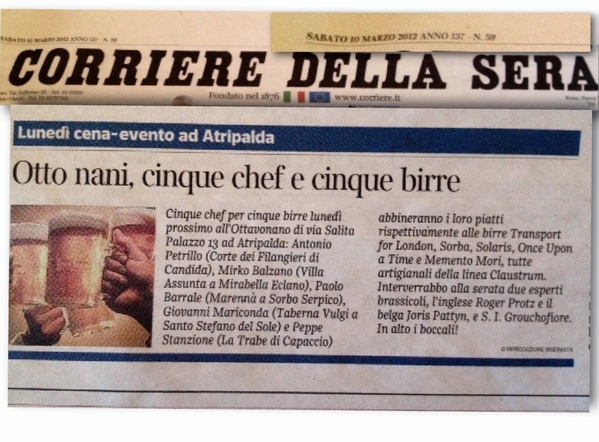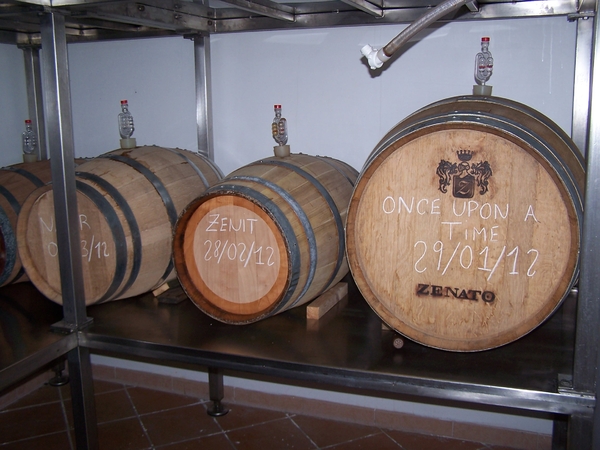Brewing up a storm in the shadow of Vesuvius
Added: Saturday, March 17th 2012

A small artisan brewer making English, Belgian and Scottish ales, with some aged in wood, may not sound unusual these days – except the beers are being produced in southern Italy, where brewing traditions are thin on the ground.
I discovered the beers when I was invited by Gianluca Polini and Yuri Di Rito to take part in a beer-and-food matching event at their pub, Ottavonano, in Atripalda in the Campania region, centred on Naples. Gianluca and Yuri challenged local chefs to prepare dishes that would complement special beers brewed by Simone Della Porta. The evening was called Campania’s Handcrafted Ales and Cuisine and it attracted not only 70 beer-loving diners but representatives of the media, including a leading wine writer. The event was publicised by one of Italy’s main daily newspapers, Corriere Della Sera (clipping above).
Simone Della Porta (main image) owns the brewery Il Chiostro – the Cloister – in Nocera Inferiore. The brewery’s name pays homage to the famous monastery of Monte Cassino, founded by St Benedict, and the scene of one of the epic battles of World War Two. Simone, with his twinkling eyes, bushy beard and generous paunch, looks like everyone’s image of a merry monk but his inspiration came not from monastic beers but as the result of a visit to Edinburgh.
He was entranced by the beers he tasted from the Caledonian brewery and he returned to Italy determined to brew. In 2005, he built his own plant, which can produce 150 litres of beer per brew. It’s a conventional ale plant based on a mash tun and copper though, continuing the Caledonian theme, the copper is fired by direct flame to ensure a good “rolling boil” of wort and hops.
Simone imports the finest malting barley from Crisps in England and gets his hops from England and the United States. Soft water comes from a well on the site. As well as British-style ales, he has expanded into Belgian styles and now imports pale malt from the Low Countries. He uses two yeast cultures from Scotland and Belgium.
All his beers are re-fermented in the bottle – it’s the first time bottle-conditioned beers have been seen in the Campania region. They’re on sale in restaurants, including some with awards and stars for the excellence of their cuisine. The restaurants include Al Convento in Cetara on the ravishing Amalfi coast: the restaurant is based in a former Franciscan convent and has won three stars from L’Espresso magazine, its top rating. In a region famous for its wines, this is bringing beer to the attention of a new audience.
For the event, Simone had tried his hand at cask beer, a Scottish ale with the disconcerting name of Transport for London. It was pale for the style and generously hopped: not perhaps a typical Scottish beer but highly drinkable, pulled by a handpump from an oak cask.
At the brewery, Simone brews a 5.5% Gold Ale made with pale and Pilsner malts and hopped only with American Cascades. The golden beer has a tangy citrus character with a honey note from the lager malt and a big punch of bitter hops.
With Porta in his name, Simone has naturally turned his hand to making a dark beer – in this case an Imperial Russian Stout called Once Upon a Time. It’s aged in French oak casks and then matured in bottle for three months.
It has a mighty 13% alcohol rating and is made with chocolate malt and caramel malt, it’s hopped with Galena and fermented with Scottish yeast. It has bitter chocolate on the nose along with peppery hops, a woody note, and liquorice and raisin fruit. It’s bitter, oaky and smoky in the mouth and finish.
A barley wine called Once Upon a Time is 11% and is aged in Taurasi wine casks for 13 months and then eight months in bottle. It’s brewed with Maris Otter pale malt only, with East Kent Goldings and Northdown hops. It has a big oak and vanilla nose with red berry fruit and spicy hops. On the Belgian front, Simone brews Solaris, a 9% strong beer with pale malt, Cascade hops and a yeast culture from the Achouffe brewery, and Sorba, an 8% fruit beer made with pale malt and Goldings, Scottish yeast and the addition of sorba, the Italian for rowan apples, which start a further fermentation. The beer is aged for eight months and it has a sour, spicy, peppery character.
Simone’s casks are made for him by D’Ambrosio Botti in Sarno, the only traditional cooperage in the region, where casks – primarily for the wine trade – are fashioned by craftsmen using ancient tools to assemble staves without the use of adhesives.
The beers and dishes at the special culinary event in the Ottavonano bar were: Entrée – Transport for London cask beer with hamburger di baccalà (salted cod), crusty bread, cherry tomatoes from the slopes of Vesuvius where the volcanic soil is rich in minerals, and beer sauce (tofu burger for vegetarians); Antipasto – Sorba fruit beer with chestnut soup, porcini mushrooms and potatoes with sausage (no sausage for vegetarians); Main course – Solaris strong Belgian ale with pork cooked at a low temperature with rowan apples cooked in beer (Japanese soya protein for vegetarians); and Dessert – Memento Mori barley wine with chestnut mousse, rowan and apple sorbet, crispy rice and cherry tomato jelly. The food was superb -- a great tribute to Italian cooking and the care the chefs had taken in matching their dishes with beer.
The name Ottavonano means the Eighth Dwarf and is a rather obscure joke about Snow White: there was an eighth dwarf who was excluded by the other seven as a result of his boozy behaviour and lascivious attitude to Snow White. Ottavonano, 13 Via Salita Palazzo, Atripaldi, AV, Italy. Tel: +39 0825 611368. www.ottavonano.com. www.ilchiostro.net.
*Thanks to Guiseppe Guanci: www.tastingcampania.com.









